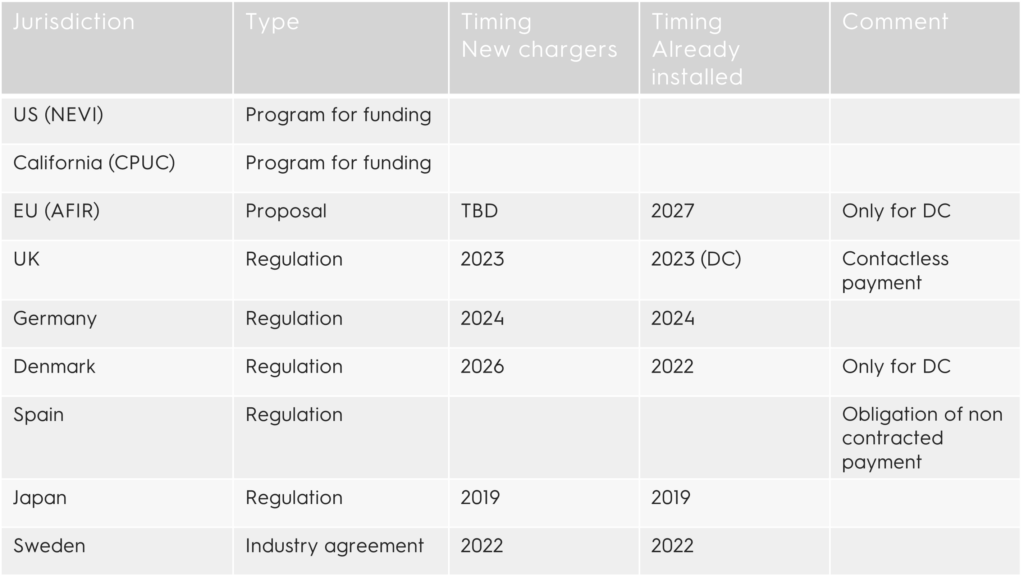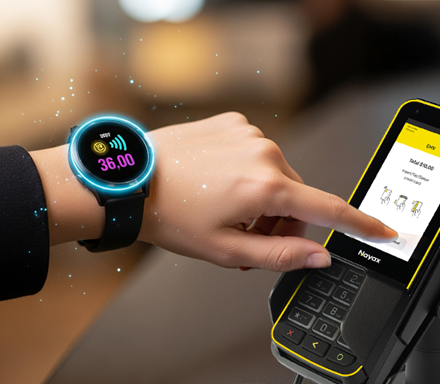As the popularity of electric vehicles continues to grow, governments and regulators are working to make it easier for EV drivers to charge their cars. One of the key areas of focus is payment. Currently, most EV charging payments are made via subscription models, with RFID cards, tokens, or in-app purchases. This model makes it less convenient for EV drivers to pay for charging, because they often need to subscribe to several different services to make sure that they can charge no matter where they are. This is why regulators are starting to encourage open payment systems, ensuring that EV charging stations have other payment methods available such as QR codes or POS terminals with payment cards so that drivers can have a frictionless payment experience and charge wherever they want.

Regulators in the two main EV markets, the United States and the European Union, have developed programs to promote open payments. In the EU, the European Commission, European Parliament, and European Council have proposed the Alternative Fuel Infrastructure Regulation (AFIR). The AFIR proposes that open-loop card payments on DC chargers be mandatory. The proposed regulation will require new chargers to offer open payments from the date the regulation goes into effect and will require that payment terminals be retrofitted onto existing charging stations by 2027.
In the US, the Department of Transportation’s Federal Highway Administration (FHWA) National Electric Vehicle Infrastructure (NEVI) Formula Program provides funding to states to strategically deploy EV charging stations and establish an interconnected network. Funding is available for up to 80% of eligible project costs, including the acquisition, installation, and network connection of EV charging stations, proper operation and maintenance, and long-term data sharing. EV charging stations must be non-proprietary, allow for open-access payment methods, be publicly available or available to authorized commercial motor vehicle operators from more than one company, and be located along designated FHWA Alternative Fuel Corridors (AFCs). The UK market is also leading the charge, with regulation that already requires any charging station over 8kW to come with a POS.
These and other regulation initiatives are taking place in 55% of major EV markets:

Source: EV Charging Payments, White Paper by Mastercard, June 2023
These programs are designed to make it easier and more convenient for EV drivers to charge their cars. In fact, according to Mastercard’s June 2023 White Paper on EV Charging, 65% of EV drivers would rather use a POS. By promoting open payments, drivers will no longer need to download dozens of apps to reduce their range anxiety. Instead, they will be able to use a single payment method of their choice across all charging stations. This will help to reduce the barriers to EV adoption and encourage more people to switch to electric vehicles.
Open payment systems such as Nayax’s EV charging solution provide drivers with a convenient, flexible, secure, and efficient charging experience. Nayax offers EV charging stations with embedded payment terminals, and charging station manufacturers can also purchase the payment terminals to install on their charging stations before market, and charge point operators can purchase the payment terminals and retrofit them on their existing charging stations.
Ask us about our EV charging payment terminals
On top of accepting over 80 payment methods in over 40 currencies, Nayax’s EV payment terminals also come with a robust management system that enable CPOs to manage their network remotely, 24/7. Nayax’s robust payment technology also covers billing and clearing, and enables operators to create loyalty programs for drivers, encouraging them to charge at their stations more often. Nayax has also integrated with Spark and Charge Point Management Systems (CPMS) to help drivers find their stations more easily.
In conclusion, the move towards open payments for EV charging is a positive step towards making EV charging more accessible and convenient for drivers. As the AFIR and NEVI programs continue to evolve, we can expect to see more open-payment options available for EV drivers. If you want to learn more about Nayax’s payment solutions for EV chargers, contact us today.


